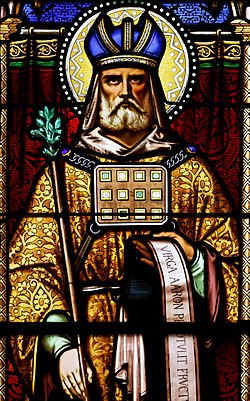Aaron

Aaron
Etymology: "Ark"
One biblical tradition considers him as Moses' assistant and minister, a witness to his signs, and his substitute (Ex 4:15, 30; 7:1; 8:1-3).
Another tradition presents him as the brother of the prophet and of Mary, connected to the tribe of Levi, and the first of the Hebrew priests, who passed this ministry on to his descendants (Ex 6:20, 23; 39).
Sadly, he was the builder of the "Golden Calf," which he was asked to make in Moses' absence, marking the first apostasy of the people (Ex 32). He died without entering the Promised Land (Num 20:1-13). The Letter to the Hebrews contrasts his sacrificial priesthood with the previous and superior priesthood of Melchizedek, to which Christ belongs (Heb 5:1-4).
# Aaron Etymology: Understanding the Origins and Significance
The name Aaron holds a significant place in religious traditions, particularly within the context of the Hebrew Bible. As you delve into the etymology of Aaron, you uncover rich historical and cultural layers that contribute to its enduring importance. This article explores the origins, meanings, and various traditions associated with the name Aaron, providing insights into its biblical significance.
The Origins of the Name Aaron
Aaron Etymology
The etymology of the name Aaron has intrigued scholars for centuries. In Hebrew, Aaron is spelled "אַהֲרֹן" (Aharon). The exact origin and meaning of the name remain subjects of debate among linguists and historians. Several theories suggest possible meanings, each offering a different perspective on the name's significance.
One theory posits that Aaron is derived from the Hebrew word "har," meaning "mountain" or "exalted." This interpretation aligns with Aaron's elevated status as a high priest and his close relationship with Moses. Another possibility is that the name comes from the Egyptian "aha rw," which translates to "warrior lion." This suggests a strong and protective character, fitting for someone who played a crucial role in guiding the Israelites.
Aaron Biblical Etymology
In biblical tradition, Aaron is one of the most important figures, serving as Moses' brother and the first high priest of the Israelites. The name Aaron appears prominently in the Hebrew Bible, particularly in the books of Exodus, Leviticus, and Numbers.
Aaron as Moses' Assistant
One of the primary roles of Aaron in the Bible is as Moses' assistant and spokesperson. In Exodus 4:15-30, God appoints Aaron to be Moses' mouthpiece, allowing Moses to convey God's messages to the Israelites and Pharaoh. Aaron's eloquence and leadership complement Moses' prophetic vision, making them a formidable team in leading the Israelites out of Egypt.
In Exodus 7:1-8, Aaron is portrayed as a key figure in performing miraculous signs, reinforcing his position as a witness to God's power. These signs not only demonstrate divine authority but also serve as evidence of Aaron's integral role in the liberation of the Israelites.
Aaron as the First High Priest
Another significant tradition presents Aaron as the brother of Moses and the first high priest. As the high priest, Aaron is tasked with performing sacred rituals, maintaining the Tabernacle, and mediating between God and the Israelites. This role underscores the religious and ceremonial importance of Aaron, highlighting his contribution to the spiritual life of the Israelite community.
Aaron Name Meaning
The meaning of Aaron's name is multifaceted, reflecting both cultural and religious dimensions. In addition to the interpretations mentioned earlier, some scholars suggest that Aaron might mean "light-bringer," connecting it to his role as a spiritual leader and guide for the Israelites.
The name Aaron has transcended its biblical roots to become a popular given name in various cultures. Its association with leadership, strength, and spiritual guidance continues to resonate, making it a favored choice for parents seeking a meaningful name for their children.
Aaron's Legacy and Influence
Aaron's Role in Religious Traditions
Aaron's legacy extends beyond his biblical narrative, influencing various religious traditions. In Judaism, Aaron is revered as the ancestor of the Kohanim, the priestly class. The rituals and responsibilities associated with the priesthood trace back to Aaron, emphasizing his foundational role in Jewish religious practice.
In Christianity, Aaron's role as a high priest foreshadows the priestly ministry of Jesus Christ, as outlined in the New Testament. Aaron's duties and sacrifices in the Tabernacle prefigure the ultimate sacrifice of Christ, drawing theological connections between the Old and New Testaments.
Aaron in Cultural Context
The cultural impact of Aaron's story is evident in art, literature, and historical texts. Throughout the centuries, artists have depicted scenes from Aaron's life, capturing his significant moments and contributions. Literature, too, often references Aaron in discussions of leadership, faith, and divine calling.
Conclusion
The etymology and significance of the name Aaron offer a fascinating glimpse into the intersection of language, culture, and religion. As both a historical figure and a symbol of spiritual leadership, Aaron's story continues to inspire and inform our understanding of biblical traditions. Whether viewed through the lens of etymology, biblical narrative, or cultural impact, Aaron remains a pivotal figure whose legacy endures across time and traditions.
By exploring the rich tapestry of meanings and interpretations surrounding Aaron, we gain a deeper appreciation for the complexities of biblical history and its ongoing influence in our world today.



.jpg)









.jpg)





.jpeg)





.jpeg)



.jpeg)








.jpeg)



.jpeg)

.jpeg)

.jpeg)

.jpeg)




.jpeg)
.jpg)

.jpeg)






.jpeg)
.jpeg)




.jpeg)





.jpeg)


.jpeg)

.jpeg)

.jpeg)

.jpeg)







.jpeg)
.jpeg)
.jpeg)





.jpeg)



.jpeg)






.jpg)
.jpeg)









.jpg)


ulva-Logo.jpg)




.jpeg)



.png)















.png)























